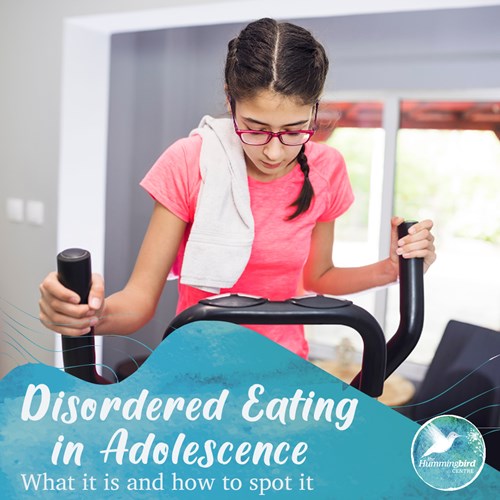Eating Disorders: Symptoms and Treatment
Eating disorders consist of persistent distorted beliefs and perceptions about weight, food, and body size or shape that result in excessive changes to eating and/or exercise behaviours. These disorders interfere with a person’s functioning in important areas of life such as physical and psychological health, quality of life, relationships, and work or study, etc.
Approximately 9% of Australians will experience an eating disorder during their lifetime, and women are more likely than men to experience an eating disorder. There are a number of conditions that fall under the category of Eating Disorders, some of which tend to present for treatment in therapy more commonly, including Anorexia Nervosa, Bulimia Nervosa, and Binge-Eating Disorder.
The factors that contribute to the development of an eating disorder are complex and varied, but it has been found that there are factors that may increase the likelihood of developing an eating disorder, including:
- Psychological factors which can include personality traits such as:
- Perfectionism
- Low self-esteem
- Avoidant personality tendencies
- Neuroticism
- Obsessive compulsive tendencies
- Negative emotionality
- Socio-cultural influences such as idealised representations of beauty and thinness through social media, advertising, and mass media etc.
- Genetic vulnerability
The most common eating disorders are Anorexia Nervosa, Bulimia Nervosa and Binge-Eating Disorder, which will typically present in the following ways:
Anorexia Nervosa (AN)
- Restriction of energy (food) intake resulting in significantly low body weight (less than minimal expected).
- Intense fear of gaining weight, becoming fat, or persistent behaviour that interferes with weight gain.
- Distorted perception of one’s own body weight or shape, excessive influence of body weight or shape on self-evaluation, or persistent lack of recognition of the seriousness of the low body weight.
- Can include subtype categories characterised as restricting, or bingeing/purging.
Bulimia Nervosa (BN)
- Repeated occurrences of binge-eating, which may be eating in a discrete period of time an amount of food that is definitely larger than what most people would eat in a similar period of time, and a sense of lack of control over how much or stopping eating during that time.
- Repeated compensatory behaviours aimed at preventing weight gain such as self-induced vomiting, misuse of laxatives, diuretics or other mediations, fasting, or excessive exercise.
- Binge eating and compensatory behaviours occur, on average, at least once a week for 3 months or more.
- Self-evaluation is overly influenced by body shape and weight.
Binge-Eating Disorder
- Recurring binge eating episodes, which consist of eating a substantially larger amount of food that what other people would eat in a discrete period of time (e.g. 2 hours), and a sense of lack of control over eating during that time.
- Includes (3 or more of):
- Eating much more quickly than normal.
- Eating until feeling uncomfortably full.
- Eating large amounts of food when not physically hungry.
- Eating alone because of embarrassment about the amount of food being consumed.
- Feeling depressed, very guilty, or disgusted with oneself.
Other eating disorders and specifications (Other specified Feeding or Eating Disorder (OSFED)) include Atypical Anorexia Nervosa (includes individuals within or above normal weight range), Purging Disorder (recurring purging behaviours in the absence of binge eating), and Night Eating Syndrome. Approximately 30% of people presenting for treatment of an eating disorder will fall into this category of eating disorders. Other problems and conditions often associated with eating disorders include Body Dysmorphic Disorder and Body Obsession. Further information about these conditions can be found at www.butterfly.org.au
Treatment
Eating disorders can result in serious medical and psychological complications, and have a high mortality rate, thus it is important to access treatment for these conditions. Research shows that the most effective treatments for eating disorders include multidisciplinary input from a team of health professionals (e.g. treating GP/doctor, psychologist, dietitian) and are based in a cognitive behaviour approach – Cognitive Behaviour Therapy (CBT) and Cognitive Behaviour Therapy – Enhanced (CBT-E).
The psychological treatment of eating disorders (ED) generally consists of:
- ENGAGEMENT– Building a therapeutic relationship between clinician and client; Assessment; Case formulation – understanding and acknowledgement of the presenting problems, identifying factors contributing to and maintaining the eating disorder; enhancing motivation; clinician and client work together to development a plan.
- SELF-MONITORING – Client recognising the processes, and patterns, thoughts, feelings and behaviours, and the context in which these occur. Recording occurrences of ED thoughts, feelings and behaviours, and when and how the client addresses these.
- IN-SESSION WEIGHING – Education and rationale for this is provided to and discussed with the client. Relationship between weight and eating habits is explored. Clinician monitors risk.
- REGULAR EATING – Education provided to the client about symptoms, risks, triggers, and distorted perceptions of food and weight. Rationale for changes is discussed. More structured eating is implemented.
Conditions such as anxiety, depression, obsessive compulsive disorder (OCD), personality disorders, Post Traumatic Stress Disorder (PTSD), and substance use disorders, etc can often co-occur with eating disorders. If you or someone you know is concerned about the possibility of these conditions, your GP or mental health professional can discuss this with you, and information can be found at websites such as:
- https://www.beyondblue.org.au/the-facts/anxiety
- https://www.beyondblue.org.au/the-facts/depression
- https://www.beyondblue.org.au/the-facts/anxiety/types-of-anxiety/ocd
- https://headtohealth.gov.au/mental-health-difficulties/mental-health-conditions/personality-disorders
- https://www.phoenixaustralia.org/
- https://www.counsellingonline.org.au/understanding-addiction
The Butterfly Foundation www.butterfly.org.au provides support for eating disorders and body image issues, along with a national helpline on 1800 334 673 (8am to midnight, 7 days a week), and online and email chat options. The National Eating Disorders Collaboration (NEDC) https://www.nedc.com.au/ provides information about eating disorders and body image.
In the Newcastle area, the Centre for Psychotherapy (Newcastle) has an Eating Disorders Day Program and individual treatment for eating disorders. Phone (02) 4924 6820 for more information.
As of November 2019, the Australian Government increased the number of Medicare rebates for eligible individuals with an eating disorder to a maximum of 40 assessment and treatment sessions per year with a suitably qualified mental health professional, and up to 20 dietetic sessions per year with an accredited practising dietitian.
Our clinicians at The Hummingbird Centre are skilled and experienced in assessing and treating eating disorders and associated conditions.

